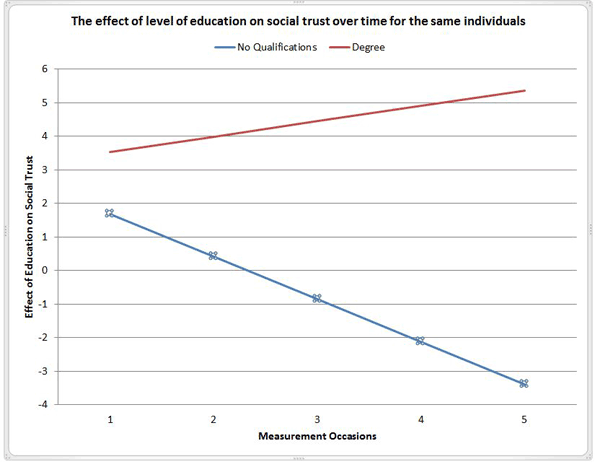About the research
It’s a common assumption that a person’s educational achievements say a great deal about their social status. Indeed, salary, job title, and even choice of marriage partners have become more closely related to education level than to more traditional indicators like family social class, demonstrating just how important a person’s education level is in determining where they stand in society, and with whom they interact.
This high value on education may account for the finding that education levels predict a range of important personal and socio-political outcomes such as political interest and cynicism, social trust, health, well-being, nationalism, and attitudes towards immigrants and immigration. But research to date has not directly compared the strength of the ‘education effect’ on this diverse range of outcomes, nor whether these effects have remained stable over time.
This study, funded by the ESRC’s Secondary Data Analysis Initiative, is the first to compare the strength and stability of the ‘education effect’ on such a range of variables over time. It is also the first to investigate whether these variables change over time for the same individuals, and whether this change is related to their level of education.
The findings indicate that higher education levels are robustly associated with higher levels of political interest, social trust, health, and well-being, and lower levels of political cynicism and hostile intergroup attitudes. These effects were also found to be relatively stable over time. Furthermore, most of these beneficial effects of education are due to the benefits associated with achieving a university education.
These education effects were also found within the same individuals over time. Especially for social trust — a variable often seen as the glue which binds a successful society together — the effect of education tends to become stronger as individuals age.

The analyses demonstrate the pervasiveness of the education effect, and underscore the need for education (and especially higher education) to be made as widely accessible as possible.
Methodology
For data from the British Social Attitudes Survey, the researchers used multi-level regression analyses of individuals nested within survey years, covering the years 1986 to 2011. They used each person’s highest educational qualification to predict the following outcomes: political interest and cynicism, social trust, health, well-being, nationalism, and attitudes towards immigrants and immigration. They also controlled for individuals’ age, gender, income, occupational status, and marital status.
For data from the British Household Panel Survey, they used latent growth modelling to analyse within-individual change across the survey years 1992-2008 in interest in politics, social trust, well-being, and nationalism, and whether the individual’s highest qualification predicted this change.
For data from the International Social Survey Programme, they used multi-level regression with individuals nested within nations and within survey year (1995-2011) to assess the effect of level of education on these outcomes.
Publications
Findings from this research are currently under peer-review for an academic publication.
This study has also attracted additional funding from the European Association of Social Psychology for related research into the role of identity in explaining why stigma (such as low education) is associated with these outcomes, and is being continued by further studies at both Cardiff University and the University of Groningen.
